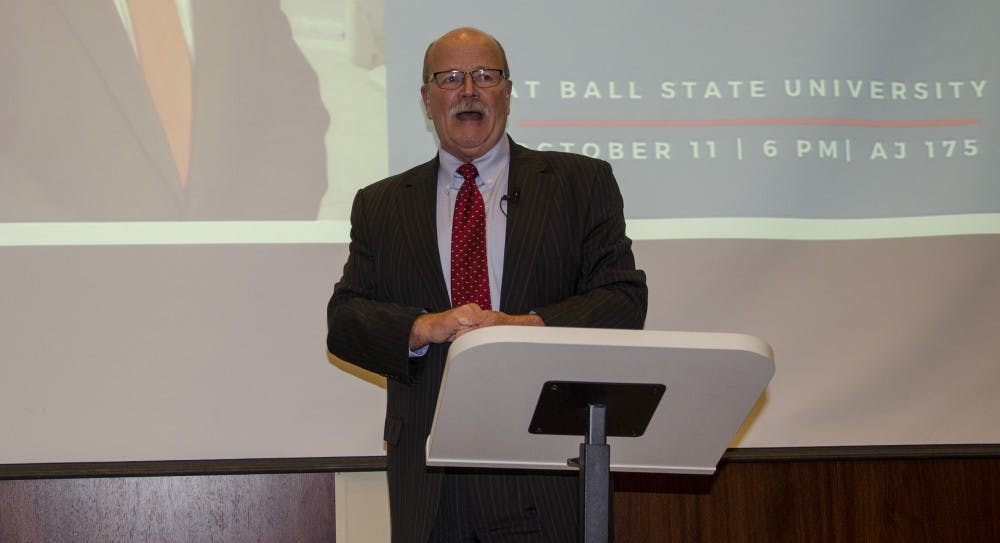For college students wondering about their own economic futures, democratic candidate for governor John Gregg had a story about his own family when he spoke on campus Oct. 11.
“One of my boys is finishing out his associate’s degree and is trying to decide whether he is going to go on,” Gregg said. “He makes about $11 an hour and has some benefits … he doesn’t have any money — he doesn’t get it from me. And he lives at home. And you’ve got people trying to raise a family on that or less? It’s a problem.”
Like many politicians this year, Gregg, running against Republican Eric Holcomb, is talking about the economy. He said he is focusing on job creation, and not social issues.
“I am not interested in running for governor to tell you who to live with, or who to love,” Gregg said. “I’ve got no desire to go to anybody’s doctors visits, which our current administration seems fascinated with ... I’m not going to go to the doctor’s office with anybody.”
Gregg said Indiana ranks 38th in terms of income among the states. While he believes the minimum wage should be raised, he doesn’t have an exact number he thinks it should be raised to and said raising it is really a job for Congress.
“You can’t raise a family on 7 bucks and a quarter … we all know that,” he said. “Work ought to pay more than staying home. There’s a reason why … when employers say they can’t get people to work, you want to say, ‘duh.’ You can’t raise a family.”
If elected, Gregg’s first act would be an executive order extending civil rights protections to LGBT people who work for the state of Indiana. He said it is all too easy for people to get fired or have leases terminated because of their sexual or gender orientation, even though the Supreme Court has ruled same-sex marriage as legal in the state.
“So we do need those civil rights protections,” Gregg said. “That’s a big difference between my opponent and myself. He keeps saying it’s not an issue.”
Another issue that came up in Gregg’s talk was education — specifically statewide, optional preschool. Indiana is one of just eight states in the country that does not provide such a program.
“I’m tired of us being the Alabama of the north,” Gregg said. “If 42 states have it and can do it, ... Why don’t we have it? It works.”
Gregg listed several benefits of preschool for the state’s 80,000 4-year-olds:
- increased high school graduation rates
- decreased risk of drug problems
- decreased chance of being jailed
- more likely to attend post-secondary education
- will make $160,000 more in their lifetime compared to those without preschool
- longer, healthier lifespans
He also said he had gone over the budget with Glenda Ritz, the Indiana Superintendent of Schools, and said they had the money to start the programs.
Gregg also hopes these children who make it to post-secondary education stay in Indiana and continue to do so after earning a degree or certificate — and several Indiana businesses agree. Gregg recalled a meeting with John C. Lechleiter, the president and CEO of Eli Lilly — one of the state’s largest companies.
“[Lechleiter] didn’t talk to me about taxes,” Gregg said. “He said we’ve got to be a welcoming community — we’ve got to stop this pointing our fingers at different people, saying we don’t want them here. He said it’s killing them.”
Gregg said Lechleiter also talked about the need for preschool programs to give children a strong head start educationally. Joe Raver, the president and CEO of another large Indiana business, Hillenbrand, also said these were key issues affecting businesses in a meeting with Gregg.
Other people in attendance included Mayor Dennis Tyler, members of the Ball State Democrats and other elected officials. On the last day of Fall Break, only a few dozen students were there, but Gregg appeared to be energized.
The former speaker of the Indiana House of Representatives, who has also served as a corporate lawyer and interim president of Vincennes University, pointed out that he lost the last race for governor by only 2 percentage points, and he was hoping to close the gap this time. Grinning, he told the students he was happy to be with them.
“I know you really don’t have to be [back on campus] until tomorrow … so I’m glad you came back tonight,” Gregg said. “It’s great to be on a college campus when you don’t have to take a test.”





